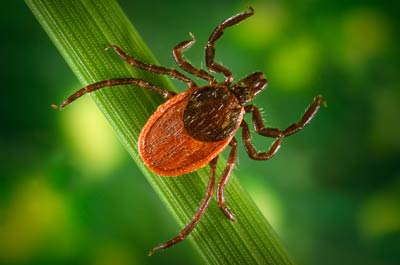Tick Tock, Knock Knock
Ahhh. Spring is here. Don’t you like longer days with grass turning green and trees budding? Put away the heavy jackets, fly kites and run into the woods. WAIT! Hungry ticks are just waking up after the long, brutal winter and they are HUNGRY! Most ticks go through four life stages: egg, six-legged larva, eight-legged nymph, and adult. After hatching from the eggs, ticks must eat blood at every stage to survive. Ticks that require this many hosts can take up to 3 years to complete their full life cycle. Ticks can feed on mammals, birds, reptiles, and amphibians. Most ticks prefer to have a different host animal at each stage of their life.
Ticks are known to transmit many human diseases. In addition to Lyme disease, which causes flu-like symptoms that can progress to joint pain, fatigue and other debilitating symptoms, blacklegged ticks can also transmit other diseases like anaplasmosis, babesiosis, both are bacterial infections similar to Lyme, and rare Powassan virus, which attacks the brain.
A simple way of preventing tick bites is backyard tick control. In your backyard, ticks are not out in the middle of your lawn, they live where yards border wooded areas, ornamental plantings and gardens, or anywhere it is shaded and there are leaves with high humidity. Here are a few tips for you:
1. Trim low-hanging branches, rake & remove leaf litter and fallen branches. Leaf litter increases humidity for poppy-seed sized nymph ticks.
2. Protect pets with tick knockdown products or talk to your vet about preventative treatments for pets. Use containment (fences, invisible fencing) to create tick safe zones for pets.
3. Wear shoes, socks and pants. Tuck in shirt. Do a daily tick check as soon as possible after being in potential tick habitat.
4. Create a 3-ft tick buffer zone if your property is right next to woodsy areas. Keep grass very short in the buffer zone and mow often.
5. Talk to a pest management professional about seasonal tick treatments if you have thick woods and dense ornamental shrubs around your property or you have abundant wild life visit your land which may carry ticks on them.






